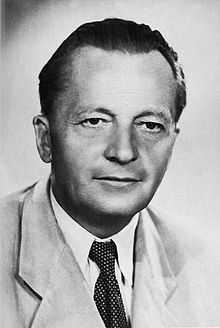Erik Molnár
| Erik Molnár | |
|---|---|
 | |
| Minister of Foreign Affairs of Hungary | |
| In office 24 September 1947 – 5 August 1948 | |
| Preceded by | Ernő Mihályfi |
| Succeeded by | László Rajk |
| In office 14 November 1952 – 4 July 1953 | |
| Preceded by | Károly Kiss |
| Succeeded by | János Boldóczki |
| Personal details | |
| Born | 16 December 1894 |
| Died | 8 August 1966 (aged 71) |
| Political party | MKP, MDP, MSZMP |
| Profession | politician, economist, historian |
Erik Molnár (16 December 1894 – 8 August 1966) was a Hungarian politician, who served as Minister of Foreign Affairs twice: between 1947–1948 and between 1952–1953.
Biography
During the First World War he fought at the Eastern Front where captured by the Russians. As prisoner of war Molnár met with the communist ideas in a prisoner-of-war camp in Far East Asia. Later he returned to home and finished his legal studies. After that he joined to the illegal Hungarian Communist Party's working along with his younger brother, René. He published lot of articles for the illegal communist newspapers (Gondolat, Társadalmi Szemle, Korunk).
In the Interim National Government he served as Minister of Welfare (1944–1945). Later he was appointed Minister of Information and Minister of Foreign Affairs (1947–1948). Then he was the Hungarian ambassador to the Soviet Union (1948–1949), later he worked as Minister of Justice (1950–1952). He was Minister of Foreign Affairs again between 1952 and 1953. He was the President of the Supreme Court of Hungary between 1953 and 1954, later he was appointed as Minister of Justice again (1954–1956).
He was member of the assembly from 1944 until his death, and also member of the communist party's Central Committee. Molnár played a big role in the management of the history research as member of the Hungarian Academy of Sciences's history institute and as chairman of the Hungarian Historical Society. He dealt with the problems of the Hungarian social development thoroughly, first of all with the land question, the Marxism-Leninism applied his teachings to the Hungarian relations. During the Second World War bigger studies appeared about the Árpád era's society. After 1945 Molnár dealt with the Hungarian prehistory and the feudalism with the questions of age social history, the ideological antecedents of the historical materialism and with his philosophical basis problems, the questions of the contemporary capitalism, dealt with the development of the nationalism and its development furthermore.
Publications
- Dialektika (Dialect), Budapest, 1941 (Erik Jeszenszky pseudonym).
- Magyar őstörténet (Hungarian prehistory), Budapest, 1942 (Lajos Szentmiklósy pseudonym).
- A feudalizmus kialakulása Magyarországon (The development of the feudalism in Hungary), Budapest, 1942 (Lajos Szentmiklósy pseudonym).
- Az Árpádkori társadalom 1. A gazdasági alap (The society of the Árpád Era I: The Economy), Budapest, 1943 (Lajos Szentmiklósy pseudonym).
- Az Árpádkori társadalom 2. A Felépítmény (The society of the Árpád Era II: The Forecastle), Budapest, 1943 (Lajos Szentmiklósy pseudonym).
- Dialektika (Dialect), Budapest, 1945.
- A magyar társadalom története az őskortól az Árpádkorig (The history of the Hungarian society from the Prehistory to the Árpád Era), Budapest, 1945.
- A magyar társadalom története az Árpádkortól Mohácsig (The history of the Hungarian society from the Árpád Era to the Battle of Mohács), Budapest, 1949.
- A történelmi materializmus ideológiai előzményei (The ideological antecedents of the historical materialism), Budapest, 1952.
- A magyar nép őstörténete (The prehistory of the Hungarian people), Budapest, 1953.
- A történelmi materializmus filozófiai alapproblémái (The philosophical basis problems of the historical materialism), Budapest, 1955.
- A jelenkori kapitalizmus néhány gazdasági problémája (Some economic problems of the contemporary capitalism), Budapest, 1959.
- Dialektikus materializmus és társadalomtudomány (Dialectic materialism and social science), Budapest, 1962.
References
| Political offices | ||
|---|---|---|
| Preceded by Ernő Mihályfi |
Minister of Foreign Affairs 1947–1948 |
Succeeded by László Rajk |
| Preceded by István Ries |
Minister of Justice 1950–1952 |
Succeeded by Gyula Décsi |
| Preceded by Károly Kiss |
Minister of Foreign Affairs 1952–1953 |
Succeeded by János Boldóczki |
| Preceded by Ferenc Erdei |
Minister of Justice 1954–1956 |
Succeeded by Ferenc Nezvál |
| Legal offices | ||
| Preceded by Péter Jankó |
President of the Supreme Court 1953–1954 |
Succeeded by József Domokos |
| |||||||||||||||||||||||
| |||||||||||||||||||||||
|